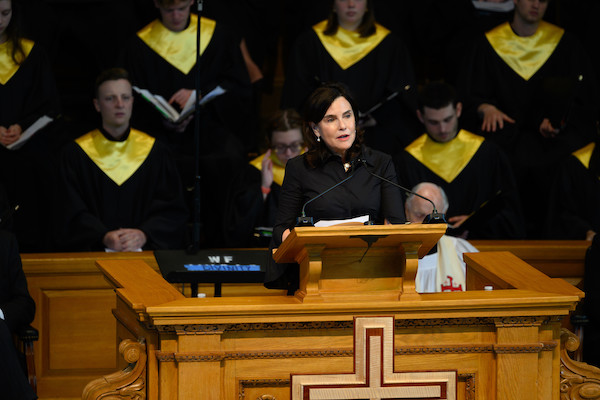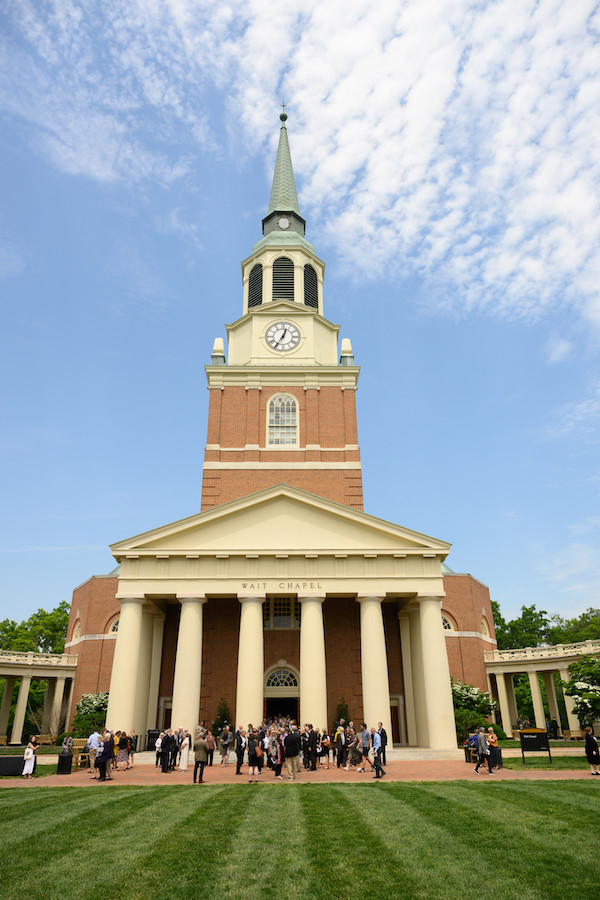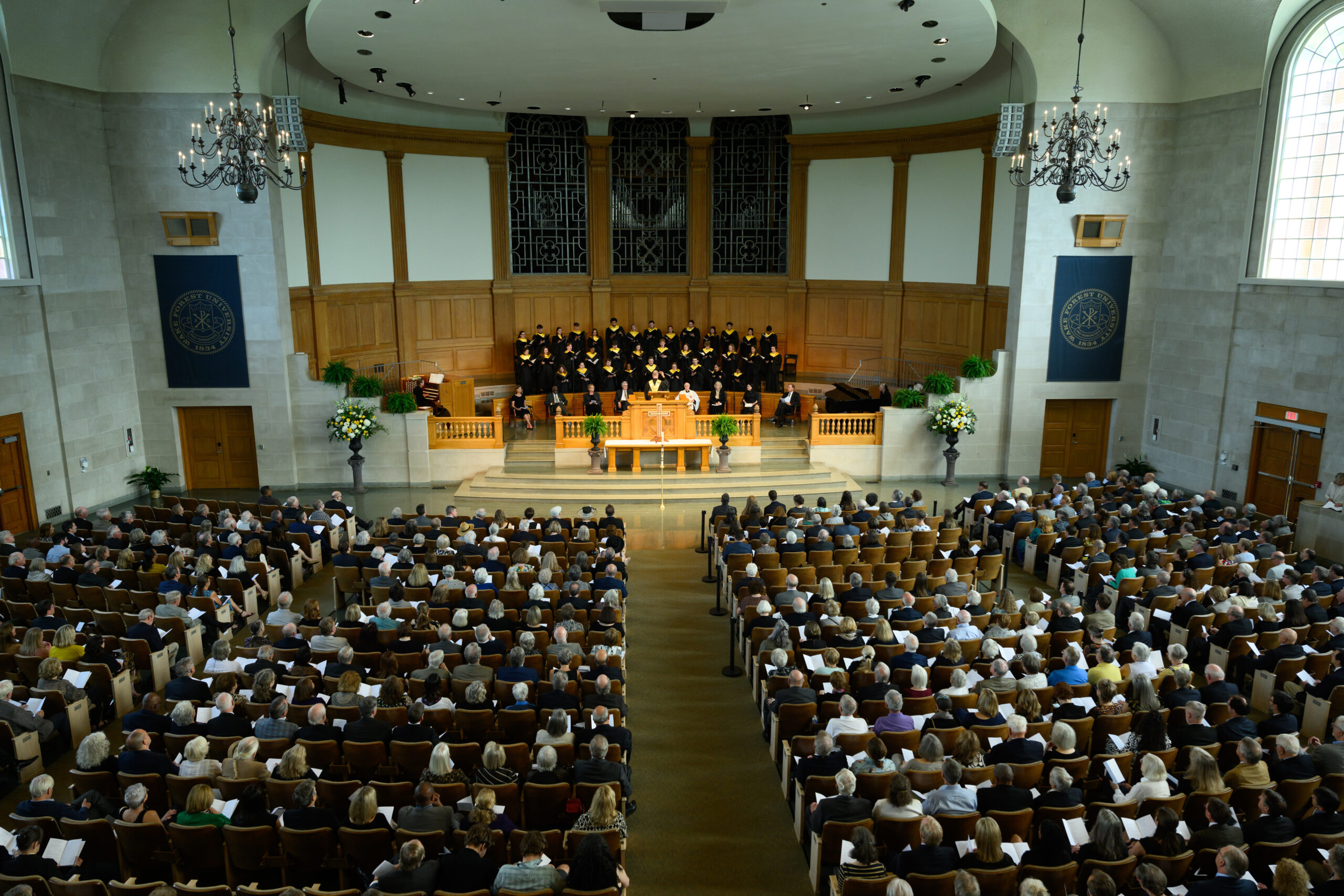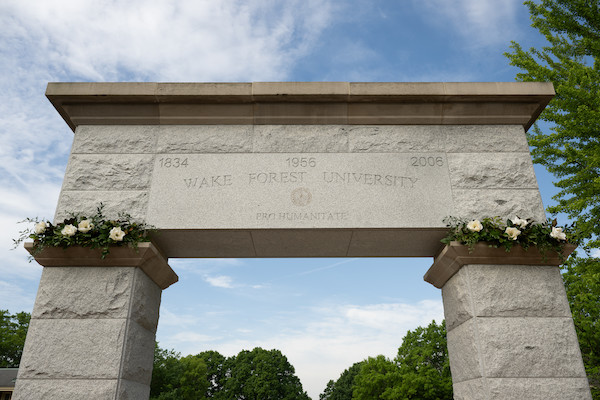Generations of Wake Foresters came to know Provost Wilson not in his administrative roles but as the sonorous voice spinning from memory the opening lines of “The Love Song of J. Alfred Prufrock” on a warm April afternoon.
In his tiered Tribble Hall classroom with its windows standing open to the scent of early magnolias, he held us spellbound, his fists thrust into his pockets, as he rocked onto the balls of his feet in the wash of language.
Ed Wilson was teacher, eulogist, historian of Wake Forest, lover of literature, university leader. His was a big role on the stage of a university that emerged into national prominence during his more than 8-decade tenure. His unimpeachable character helped shape Wake Forest; and his joy in his friends marked his life, and us, indelibly.
This is, after all, the Ed and Emily Wilson, who, clad in tuxedo and evening dress, attended a young staff member’s keg party—black tie optional–on opening night of The Piedmont Opera. It’s the Ed Wilson who rode shotgun beside late chemistry professor Paul Gross, when Gross allegedly hit 100 mph on Faculty Drive in his new Mercedes following a retirement party for History professor Jim Barefield—although Barefield swears they never hit a click over 90.

Jeanne Whitman Bobbitt
And what about the bar fight he egged on—perhaps his only barfight–or maybe his only bar fight in Texas. A small delegation of Wake Foresters had travelled to a Dallas event, and Ed Wilson—both a small “d” democrat and a big “D” Democrat—found himself in an exchange with someone who was, predictably enough in Texas, neither a small d nor big D Democrat. Words ensued, with 81-year-old Mr. Wilson calmly posing thoughtful queries—but clearly baiting an excitable and less articulate adversary–only to be met with increasing ire. Finally, as his adversary began rolling up his sleeves, Mr. Wilson was hustled from the bar—fisticuffs averted.
Most significant to Ed Wilson was his family—although they often saw little of him. We, all of us who enjoyed happy hours with him, owe a great debt of gratitude to his those at whose expense those hours often came. My conversations with Mr. Wilson in the last two decades have always circled back to his family in whom he took quiet pride and whom he loved beyond measure. He always knew what Eddie, Sally, and Julie and their families were up to and recounted their activity to me regularly.
His great love, of course, was Emily, who described their marriage to me as “unconventional”—and how could it be otherwise. The Wilsons are unconventional people. Mr. Wilson enjoyed Emily’s writer’s mind, her incisive sizing up of people, her narrative voice, her ability to make topics come alive. He often cited her comments, struck by her wisdom and insight. He remained a student of her iconoclast’s mind throughout his life, and she remained the most fiercely loyal and loving of partners and friends.

And let it not be forgotten that while he was “Mr. Wake Forest,” whose words inspired and delighted, he was also one of the chief strategists of a University built on intelligent and humane principles. He proved time and again that great leaders can be kind, empathetic, and honorable—and indeed, should be.
Ed Wilson knew that ideas and people build great institutions, and he sought and attracted both. He would interview a candidate for an appointment in accountancy, and the two would talk about the career of filmmaker John Huston. With a candidate in French language and literature, the topic might be W.J. Cash’s “Mind Of the South.” A budding law professor might be invited to tell of her relationship with the grandmother who reared her.
Mr. Wilson sought for our Wake Forest those whose values put students first, community second, and personal career third. He sought people whom he would enjoy around a dinner table at his Timberlake Lane home. Before the term “personnel” became “human capital” or “talent management,” Ed Wilson treasured people and their relationships as the center and the engine of the enterprise. He worried about external forces at work on the University, particularly about what he called the corporatization of the academic world. He saw in that a threat to the power of relationships and to human kindness.

His occasionally maddening habit of administrative procrastination was more often than not a conscious strategy. There are those of us who remember the stack of papers about a foot and a half tall that remained on his desk at all times, where files “matured,” as he once put it. He noted that if one has the equanimity to wait out the first waves of response to a problem, better information would likely emerge. That practiced discipline saved the dignity and sometimes the careers of many over the years. One particular department chair would launch a vituperative attack on the Provost nearly annually—the chair would appear in the Provost’s office, angry and emotional, ending with the flourish of a letter of criticism flung onto the Provost’s desk. Mr. Wilson would quietly file the letter with the others from that very faculty member, and continue about his business. Ed Wilson gave people time to come to the positions that their “best selves” would espouse — because that “best self” was the one he was generous enough to recognize as the “real” self.

Mr. Wilson loved movies, and in another year, he would have seen all the Oscar contenders including Greta Gerwig’s Barbie, which I suspect he would have appreciated both because it was directed by a woman and for its subversive, anti-corporate themes. Toward the end of that movie, Margot Robbie as Barbie speaks to her creator, Ruth Handler, played by Rita Perlman, about Barbie’s desire to be human. The Handler character cautions that “humans only have one ending,” [but that] “ideas live forever.” Barbie’s reply is, in part, “I want to be a part of the people that make meaning. Not the thing that’s made.”
And there, from the lips of Barbie, of all people, you have what Ed Wilson’s life was about. He was a part of the people who make meaning—and a large part of the meaning of Wake Forest.
In Ed Wilson we found the satisfaction of the life of the mind, the significance of a life of service—and an enduringly kind and generous heart. His days were illuminated by unexpected moments of whimsy and anchored in his love for his family, his joy in his friends and his abiding faith in the humanness and the humanity of Wake Forest.
Dear Old Wake Forest. Our dear Wake Forest. Not a thing that’s made, not even a place, but an idea, an idea in the minds of thousands of us who know Ed Wilson and love his Wake Forest.
We are – all of us – Wake Forest. It is up to us to make Ed Wilson’s idea, his Wake Forest, the idea that lives forever.



